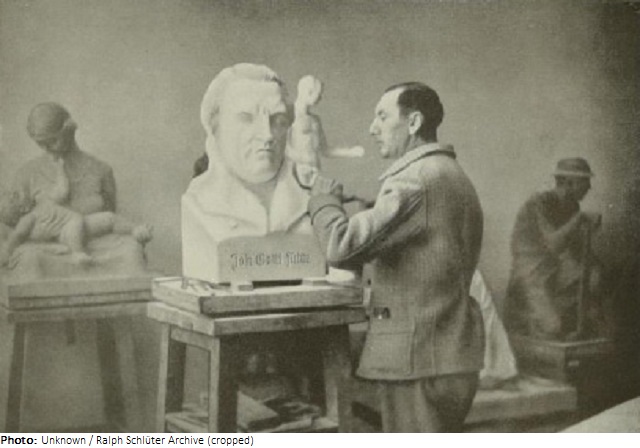Paul Berger

Biographical information
| Roles | Competed in Olympic Games |
|---|---|
| Sex | Male |
| Full name | Paul•Berger |
| Used name | Paul•Berger |
| Born | 8 April 1889 in Zwickau, Sachsen (GER) |
| Died | 30 March 1949 in Dresden, Sachsen (GER) |
| NOC |  Germany Germany |
Biography
After a mason’s apprenticeship, Paul Berger studied at the Dresden School of Arts and Crafts and the Academy of Fine Arts in Dresden. In 1912, he received the Rome Award, which included a two-year study residence in Rome. In World War I, he was seriously injured and acquired a walking disability. After a period as a freelance artist in Dresden, he was appointed professor at the Dresden Academy of Fine Arts. In the time of National Socialism, he designed heroic statues mainly with topics from the working environment and sports, but also porcelain figurines. When the city was bombed in 1945, his studio and a large number of his works were destroyed. After the war, he quickly adapted to the new communist art diktat. A few years later, he died from the long-term effects of his wartime injuries.
Paul Berger was involved in the creation of the monument for the Fallen Soldiers at Saarlouis in 1928. Originally built on the Große Markt (Big Market), the monument was moved in 1936 to its present location at the Kaiser-Friedrich-Ring. After the annexation of the Saar to the Federal Republic of Germany, the memorial figure was replaced by a modeled warrior figure of Nicholas Simon. Berger’s contribution to the 1928 art competition, the only 13 cm high silvered bronze statuette of a Female skater from 1926, is today part of the Sculptures’ Collection in Dresden.
Results
| Games | Discipline (Sport) / Event | NOC / Team | Pos | Medal | As | |
|---|---|---|---|---|---|---|
| 1928 Summer Olympics | Art Competitions |  GER GER |
Paul Berger | |||
| Sculpturing, Statues, Open (Olympic) |